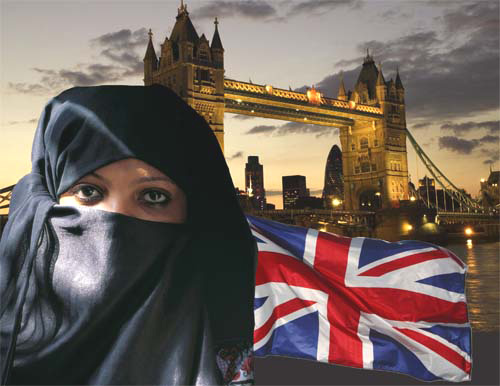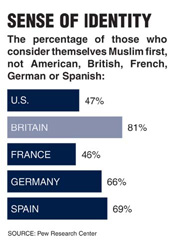 MCT
MCT
Article
British Muslims are facing a growing radical element in their midst. Moderate Muslims and non-Muslims are alarmed. What does this mean for Britain?
Learn the why behind the headlines.
Subscribe to the Real Truth for FREE news and analysis.
Subscribe NowOn April 30, 2007, five young men were sentenced to life imprisonment for conspiring to construct and detonate massive “fertilizer bombs” in Britain. The plot, had it been successful, would have resulted in the largest mass murder in the nation’s history. U.S. military tests estimated that the loss of life would have numbered in several hundred dead, possibly thousands.
Targets included a large shopping center, a gas utilities network, a popular nightclub and a football stadium. The conspirators bought 600 kilograms (approximately 1,323 lbs.) of ammonium nitrate fertilizer, also used in the Bali and Oklahoma City bombings.
The terrorist plot, known as “Operation Crevice,” led to one of the largest and most complex terrorism trials in British history. The investigation revealed disturbing evidence of links connecting the five conspirators, al-Qaeda and a massive terror network linking Europe, the Americas, Pakistan and Afghanistan, where some of the conspirators trained with the Taliban. Some had met with two of the suicide bombers who perpetrated the 2005 London 7/7 bombings.
The year-long trials focused media attention on the British Muslim community. As the shocking details emerged, soul-searching followed in the government, news media and general public. Many are struggling to come to grips with the reality that their fellow citizens born and bred in the United Kingdom desire to destroy their own country.
Several questions arise: Why are young British Muslims angry? Why are some turning to violence—even mass murder? What is the attraction to radical Islam? And what do these increasing acts of terrorism mean for Britain?
Troubled Times
The majority of Britain’s 1.6 million Muslims are civic-minded people who love their country, obey its laws and make significant contributions in all walks of life. Indeed, British Muslims have risen to prominence in government, business, the arts, science, education, sports, healthcare and many other fields.
However, in spite of this, Britain’s Islamic community has come under increasing scrutiny due to several acts of terrorism perpetrated by radical elements.
In 2001, Richard Reid, a convert to Islam, attempted to blow up an American Airlines plane by igniting explosives placed in his shoes.
British-born mujahedeen have been found fighting for the Taliban in Afghanistan.
In 2003, two British Muslims blew themselves up in a Tel Aviv bar, murdering three people and wounding 55.
In 2005’s infamous 7/7 bombings, suicide bombers killed more than 50 people in the London transit system.
In 2006, 24 young Muslims were arrested for a massive plot to simultaneously blow out of the sky as many as 12 U.S.-bound airliners.
 MCT
MCTDespite heightened security measures, the potential for acts of terrorism still exists. In 2002, British military intelligence found a list of 1,192 names of British citizens, all Muslims, who had trained with al-Qaeda in Afghanistan. Even more worrisome is that according to the Daily Telegraph, former London Police Commissioner Lord Stevens has estimated that up to 4,000 terrorist suspects are active in the nation. He has warned that al-Qaeda is trying to infiltrate the police and security services—dozens have been weeded out. Additionally, both Scotland Yard and MI5 are aware of at least 30 terrorist cells operating in Britain.
Seeds of Anger
Muslims have lived in Britain for hundreds of years in relatively small numbers. After the Second World War, their numbers surged as immigrants from all walks of life arrived from the former English colonies of India, Pakistan and Bangladesh. These were later joined by arrivals from Africa and the Caribbean.
Many immigrants were poor and uneducated. Some migrated to northern towns such as Bradford, Blackburn and Oldham to work in the textile industry. Others journeyed to London and Birmingham, often working in low-paying jobs others did not want. Because of language, cultural and religious differences, they tended to live together in large clusters. To this day, in several cities across the United Kingdom, Muslims live in segregated communities with separate cultural, educational and social networks.
 Pew Research Center
Pew Research CenterBecause of this, whole generations have come of age isolated from non-Muslims. Many of these Muslims believe they have not been accepted into British society—that they have been rejected by Britain, the land of their birth. They view fellow Muslims at home and abroad as being victims of racism, discrimination and injustice. Many are upset with British foreign policy, negative coverage of Islamic believers in the media, and increasing “Islamophobia”—a growing fear and hatred of Muslims.
These views have led to frustration and anger, particularly among youth, many of whom see only a bleak future for themselves in the UK. They believe their parents and grandparents are too passive, and that Muslim leaders are failing to address their concerns. Therefore, a growing number of young people are embracing radical Islam, and, believing they have no other alternative, are turning to violence as a means of “fighting for their rights.” In some instances extremists are being accepted as the true voice of Islam, “holy warriors” standing up for Muslims and fighting for the religion.
In the wake of the 2005 London bombings, a survey in The Daily Telegraph gauged the views of the British Muslim community. The results were revealing.
6% felt that the bombings were fully justified.
24%, while not condoning the attacks, sympathized with the suicide bombers.
56% indicated they could understand why some people might behave that way.
18% felt little or no loyalty to Britain.
32% believe Western society is decadent and immoral, and that Muslims should seek to bring it to an end.
52% believe political leaders do not mean it when they talk about equality.
50% believe the main party leaders are insincere when they say they respect Islam and want to cooperate with Muslim communities.
Another study by British think tank Policy Exchange compared the growing radicalization of young Muslims to their parents and grandparents:
40% of Muslims between ages 16 and 24 prefer to live under Sharia Law, which is based on the Koran, compared to only 17% of those over age 55. (Punishments under Sharia law include beheadings, stoning, beatings and the severing of limbs.)
One in eight young Muslims said they admired radical groups such as al-Qaeda, who are prepared to “fight the West.”
36% believed any Muslim who converts to another religion should be put to death; only 19% among those over age 55 believe this.
Three-quarters of young Muslims believe that women should wear veils, compared to only one-quarter of those over 55.
40% of younger Muslims would want their children to attend Islamic schools, compared to 20% for over 55.
Britain’s foreign policy was also a sore spot, with 58% blaming the world’s problems on “arrogant Western attitudes.”
Additionally, in a March 2004 survey by ICM Research, 66% of Muslims believed the American- and British-led “War on Terror” was a war on Islam; 45% said they would send their children to Muslim-only schools if they could; and 13% felt that future al-Qaeda attacks on the United States were justified (Seattle Times).
Radical Islamic Influence
The alienation, disillusionment and anger felt among Islamic youth are providing fertile soil for radical Islam to flourish within the Muslim community. Extremist clerics regularly condemn Britain in mosques around the country. They indoctrinate young adherents with the belief that killing “infidels” (non-believers) will bring rewards in paradise. They point to the wars in Iraq and Afghanistan as evidence of crimes against Muslims, and to the Palestinian-Israeli conflict as an example of their humiliation. And they label the UK as being complicit in these and other “atrocities” against Muslims.
Britain’s Future Revealed!
Britain’s sudden rise as the greatest empire in history—with colonies and territories spanning the globe—was not an accident. Anglo-Saxon-Celtic Britons have been the recipients of fascinating, stupendous promises, made millennia ago, that enabled them to become the dominant world power.
Today this is no longer the case—why?
As Britain struggles to overcome ever-worsening internal problems, what lies ahead for this once “Great” nation?
The United Kingdom, the United States, Canada, France, Australia, South Africa and certain other countries of the West share a common heritage—and a prophetic future. The current prosperity, coming fall and promising future of these nations were foretold long ago.
In the Bible, God promises blessings for national obedience—and curses for disobedience (Leviticus 26). Britain’s national problems will only grow worse. The nation will eventually hit rock bottom.
However, there is good news on the horizon! Britons will one day turn to the One who gave them world preeminence. In that day terrorism, suspicion, hatred and division will no longer plague the nation. All will worship the same God (Zechariah 14:9)—who will establish universal justice, equity, peace and prosperity. All Britons, along with all nations, will reap the endless benefits of living according to God’s harmonious ways in joy and unity—a truly wonderful picture!
For a more in-depth look at Britain’s ancient past and incredible future, read David C. Pack’s America and Britain in Prophecy.
You can know. There is a source that reveals Britain’s future!
In addition, terror organizations are actively recruiting young minds in mosques and universities. According to the Brunel University’s Centre for Intelligence and Security Studies, at least 25 campuses have been infiltrated by radical Islamists actively recruiting for “jihad,” or holy war.
Radical Islam’s message is simple: Supporters see the world as being controlled by Americans and Jews, and supported by Europeans. It believes the “War on Terror” is an attack on Islam, and that the West is oppressing Muslims. It sees Western civilization as decadent and immoral (many professing Christians would reluctantly admit to this claim), and seeks to convert all non-believers to Islam. Radical Islam’s goal is to restore the power of previous Muslim empires, and to firmly establish Islam as the dominant force on the world stage.
This message is resonating among the discontented.
Growing Suspicion
The increasing number of Islamic terrorist acts and plots are being viewed with growing alarm by non-Muslims. According to a Guardian/ICM poll, only 22% of Britons believe Muslims have done what is required to fit into British society. More than half (57%) feel Muslims need to do more to integrate.
Some fear that instead of being content to live according to established cultural norms, Muslims are attempting to impose their religion and culture on society. For instance, former British Foreign Secretary Jack Straw set off a firestorm of controversy when he suggested that the full burqa, a veil worn by traditional Muslim women, was “a visible statement of separation and difference.” While numerous non-Muslims supported his statement, many Muslims were deeply offended.
Another area of contention is the desire among fundamentalist Muslims for their affairs to be adjudicated by Islamic Sharia law, in place of British law. A 2006 report by the BBC Radio 4 program Law in Action produced evidence that Sharia law is already being used by some Muslims as an alternative to English criminal law.
It then went on to quote Patrick Sookhdeo, director of the Institute for the Study of Islam and Christianity, as stating, “Sharia courts now operate in most larger cities, with different sectarian and ethnic groups operating their own courts that cater to their specific needs according to their traditions.”
It also recorded a principal of an Islamic university as predicting there would be a formal network of Muslim courts within a decade.
Adding to the tension is the growing anger with Britain’s liberal immigration laws, which have led to an increase in the nation’s Muslim populace over the past 40 years. Islam is now the nation’s fastest-growing religion, with nearly two million adherents and more than 1,000 mosques.
Followers of Islam tend to produce larger families than the national average. If the growth trend continues, Muslims will eventually have greater power to effect national change.
Clash of Civilizations
All of the above has led to fear and anger among non-Muslims, some of whom believe that the traditional British way of life is under threat of extinction. This has sparked violence against Muslims—particularly by white youth—and has led to political gains by the far-right, especially the British National Party, which campaigns on an anti-immigration platform.
Muslim youth have not taken these matters lightly. Grieved by attacks against fellow Muslims, and incensed by what they perceive as slurs and insults against Islam by the media and public, they have also turned to violence. Strong feelings on both sides have led to clashes between Muslims and whites, the most violent being the 2001 race riots in northern England. This has served to further alienate young British Muslims, more of whom are identifying with radical Islam.
Reaching Out
In reaching out to the youth and working to repair damage to the community, many mosques now hold interfaith discussions, organize youth groups, and work with local police to promote goodwill. Mosques are also transforming themselves into community centers in an attempt to reduce feelings of alienation among their young people. Muslim leaders supported a government initiative to impose an English test on foreign imams (Muslim clerics) seeking work permits.
The government is also trying to reach out. For years it has poured money into state-run Muslim schools, community centers and local programs, but has had little success in winning the hearts of increasingly skeptical Islamic followers. One of the major barriers to success is Muslim discontent with British foreign policy—particularly as it relates to Afghanistan and the Middle East. Another obstacle is that Muslim leaders whom the government engages are viewed with mistrust by elements in their community, especially among the young.
Despite the best efforts of many, Muslim and non-Muslim communities continue to be separated. Suspicion of each other remains. Radical Islam continues to gain converts. And British Muslims remain at the crossroads of moderation versus the radical element within their community.
The situation will continue to worsen, though it will ultimately be resolved—but not as most think. To learn more, read our article “Is Religion the Problem – Or the Solution?”
- Real Truth Magazine Articles
- RELIGION


